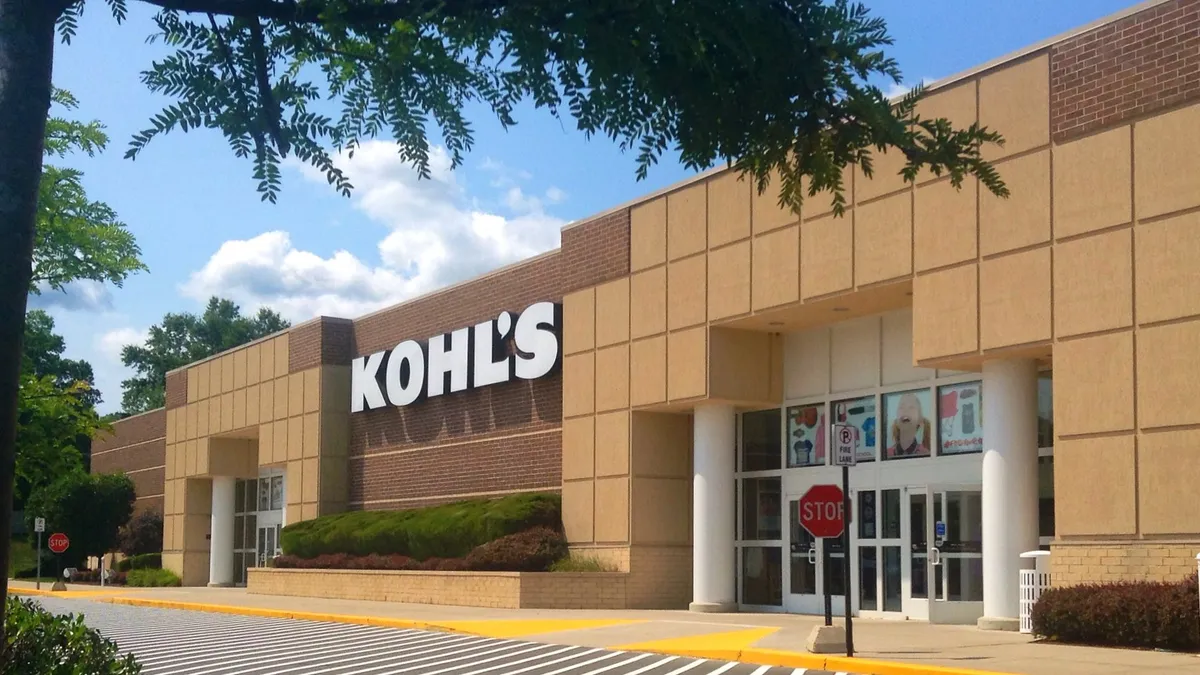Dive Brief:
- S&P Global Ratings gave Kohl’s a negative outlook, indicating the possibility of a future credit downgrade, according to an emailed release.
- The shift in outlook for the retailer, which carries a B+ rating with S&P, follows the end of acquisition talks with Franchise Group and lower company estimates for sales.
- S&P analysts pointed to the possibility that Kohl’s performance might not stabilize and the company could loosen up its financial policies to keep shareholders happy.
Dive Insight:
Kohl’s has had a tumultuous year so far. Long one of the more stable department store chains in the sector, it has been fending off activist investor attacks for the better part of a year now, as its performance fell behind some of its peers.
Activists called for asset sales, a spinoff of Kohl’s e-commerce business, ramped-up share buybacks and a sale of the company. The retailer effectively put itself up for sale this year, engaging in late talks with Franchise Group, owner of The Vitamin Shoppe, American Freight and other retail banners.
That potential deal cast a fair amount of uncertainty over Kohl’s future, as it would have ended the retailer’s independence as a company and would have led to operational and financial changes. It also would have been paid for with the sale of valuable real estate, assets that have kept Kohl’s credit rating higher and in turn its cost of borrowing lower.
Since those talks ended without a sale, Kohl’s still faces a fair amount of uncertainty, given the sharp turn the macroeconomic environment has changed for retail in recent months, with consumers heavily pressured by inflation in food and gasoline.
“We believe competitive pressures in the evolving and highly competitive department store segment remain significant,” S&P analysts said, outlining the backdrop for Kohl’s. “Apparel purchases are highly discretionary, and performance remains vulnerable to economic conditions, such as the recent macroeconomic slowdown. In addition, our longer-term view is that changing consumer preferences will be difficult to navigate, which increases the potential for operational missteps.”
Kohl’s is also still under pressure from its shareholders. The company has signaled that it is considering ways to turn its owned property into cash. That could have an effect on its financial profile. Even riskier would be to take on debt to support shareholder returns, such as stock buybacks.
S&P analysts expect Kohl’s to use some of its free cash for buybacks and dividends but that the company will also keep its leverage levels relatively low and hold cash on its balance sheet to weather downturns.
But, the analysts added, the ratings firm could downgrade Kohl’s if it “undertook shareholder-friendly initiatives,” such as debt-financed share repurchases or a large sale-leaseback of its property, which would yield cash for investors but add leasing liabilities to its books.
Kohl’s also faces risk from its retail performance, which lagged expectations last year while consumer demand was robust. Now consumers are coping with basic purchases and spending more on experiences, making a rebound at Kohl’s all the more challenging.















